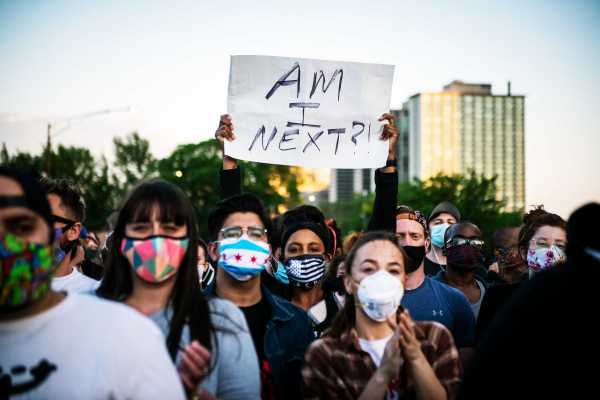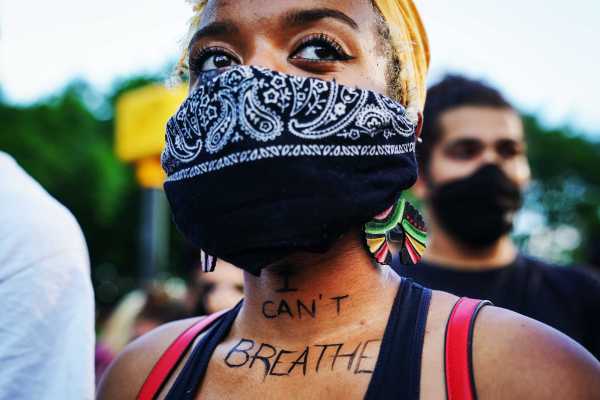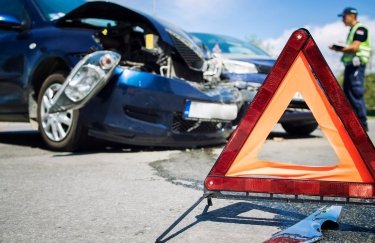 />
/>
Share this story
-
Share this on Facebook
-
Share this on Twitter
-
Share
All sharing options
Share
All sharing options for:
What public health experts want critics to know about why they support the protests
-
Reddit
-
Pocket
-
Flipboard
-
Email
As someone with asthma, Meredith Blake was very worried about getting sick in the pandemic. With Covid-19 spreading across America, she stayed inside her home in Boston for 12 weeks, isolating from others as much as possible.
Her self-quarantine ended on June 1. After George Floyd’s killing at the hands of police in Minneapolis, she was compelled to march in the streets with a large crowd of other Bostonians, in close proximity. She wore a face mask and used lots of hand sanitizer wipes.
“I was definitely a little nervous,” about catching Covid-19 in the crowd, says Blake, a researcher at the Harvard Humanitarian Initiative. But showing up and speaking out was more important to her in this moment: “I have a vested interest in the protection of black and brown people, not only professionally, but personally,” she says. She felt like she could no longer prioritize her personal safety from the coronavirus.
Blake works with public health professionals and ER doctors every day, and knew joining a crowd was dangerous — for both herself and the community. But she made a careful calculation: Covid-19 is a huge risk, and to her, the protests were worth it.
On the right, some commentators have accused public health experts of hypocrisy around the protests, for endorsing them after months of telling people to stay home to prevent the spread of the coronavirus.
Some of those commentators asked: Is it fair if the grieving can’t hold funerals for loved ones while others are marching en masse? Why should businesses stay closed when several high-profile experts say the protests are worthwhile? Author J.D. Vance, for one, fears public health expert endorsements of the protests will erode trust in expert opinion. “I’m still amazed at how quickly the moral scolding ceased as soon as elite-favored protests began taking place,” Vance tweeted.
I’ve talked to several public health experts who support the protests — both black and white — asking them what they wish people like Vance could accept.
Here’s what they say: Protesters are more afraid of doing nothing in the aftermath of George Floyd’s killing than the pandemic. And centuries of systemic racism, lifetimes of discrimination, and years of watching black people die needlessly drive those fears.
“It is hard for me as a public health professional, who also knows my history, to blanketly tell someone to take all these people off the street when they are protesting against 400 years of a different pandemic that happens to not be infectious,” Zinzi Bailey, a social epidemiologist at the University of Miami, says. “It’s not something that potentially a white person is going to catch. Right?”
People are going out into the streets because they feel like their lives depend on it, because one in every 1,000 black men could die at the hands of police. Because they fear an officer of the state will kill them for something petty, like being suspected of possessing a counterfeit $20 bill, as Floyd was. They are going out because of the systemic reasons Covid-19 has harmed black people in higher numbers, and because black people are more likely to suffer the worst course of illness.
“People are in the streets because they have to be,” Rhea Boyd, a pediatrician who works in California’s Bay Area, says. “Because that is how dire things are. Even in the setting of a pandemic, where it seems like being out there risks your life. There are so many risks on your life. You’ve got to be out there to try to protect it. People need, and black folks in particular, need a ton of changes to happen immediately.”
Missing a funeral is painful. Keeping a business closed is painful and causes real harm. No one doubts that. The question is: Can you live with the consequences?
And what if on the other hand, you feel like your life, and the lives of people you care for, depend on protesting?
Make no mistake: Protesting during a pandemic can spread Covid-19
Many protesters are following public health advice while demonstrating: wearing masks, distancing, using hand sanitizer, and getting tested for Covid-19. But it also must be said that there’s no perfectly safe way to demonstrate in huge gatherings during a pandemic, and the threat of new waves of Covid-19 is still very real.
New cases of Covid-19, nationally, have been declining from a peak, but the national numbers obscure smaller outbreaks that are on the rise in some areas. Things may be looking better, but there are still around 20,000 new Covid-19 cases each day. And that’s just the people who are getting tested. According to Ashish Jha, a professor of global health at Harvard, the real number of new daily infections in the US may be closer to 125,000.
The protests are also occurring at a deeply uncertain time during the pandemic. The overall situation appears to be improving, but a new wave could be brewing under the surface as states reopen. The incubation period of the virus, combined with limited resources for testing, means people can’t have real-time knowledge of the state of the outbreak.
No one knows what’s going to happen next, or how big the next wave might be. There are so many unknowns about how the virus will spread in a country with a patchwork system of response and varying levels of adherence to social distancing and mask-wearing.
“I have a vested interest in the protection of black and brown people, not only professionally but personally”
That said, the virus’s deadly potential is still great. We’re still looking at dealing with Covid-19 on a timescale of months, if not years.
We also know mass gatherings are risky, even if people take precautions. Yes, it’s safer that the protests are outside (there are very few documented cases of outdoor coronavirus transmission). Yes, it’s safer when people wear masks; it’s safer when people try to distance themselves from one another. But there’s no such thing as zero risk with this virus. And the math of exponential growth means it doesn’t take a big spark to create an outbreak that numbers in the thousands.
“I get very concerned, as do my colleagues in public health, when they see these kinds of crowds,” Dr. Anthony Fauci, the head of the National Institute of Allergy and Infectious Diseases and a top White House adviser on the pandemic, told WTOP on Friday. “There certainly is a risk. I can say that with confidence.”
Related
Why 15 US states suddenly made masks mandatory
It’s possible Covid-19 will spread among those marching, shouting out respiratory droplet-laden cries for justice. It’s also possible Covid-19 will spread due to the law enforcement response, throwing tear gas into crowds, making people cough, forcing them into smaller and smaller spaces, and then arresting them and confining them in small jail cells. It’s possible the infection will spread both ways.
This is not lost on the public health experts, nor is the fact that the next wave of cases may disproportionately impact the minority communities protesting. They’re more likely to get sick, more likely to be labeled essential workers if new lockdown orders come.
“I definitely worry about the potential spread of SARS-CoV-2 and how the protests that are going on may contribute to a second wave of Covid-19, which would be disproportionately affecting the black community again,” Jaime Slaughter-Acey, an epidemiologist at the University of Minnesota, says. “Being a black epidemiologist … the way that I see this is that those who are out there protesting are saying that the life of George Floyd, that black lives, matter, and that they’re prioritizing black life over their own individual life. And there is nothing more unselfish than that.”
Why some public health experts say the protests are “essential”
Some journalists have smelled a whiff of hypocrisy in epidemiologists endorsing the protests. These same public health experts did not support anti-lockdown protesters who were arguing for reopening the economy. They decried mass gatherings of people in a large swimming pool. The argument is that health experts have been changing their recommendations, now that there’s a protest that aligns with their social justice politics.
“One thing I’ve been telling people is that the guidance hasn’t really changed from a public health perspective,” Eleanor Murray, a Boston University epidemiologist, says. “It’s always been ‘stay home as much as possible, except for essential activities.’ But the definition of essential is not a scientific one — it’s a sociological one. … Protesting police violence is an essential activity for a lot of people.”

(It’s not surprising a lot of epidemiologists feel this way. When not dealing with a pandemic, they often study societal inequities and the social determinants of health. Because of this work, we now know a lot about systemic racism and its impacts on health.)
Alison Bateman-House, a medical ethicist at NYU, says we need to think carefully about the costs and benefits of each type of protest.
“Your desire for a haircut is not sufficient to counterbalance the potential of harm that you are imposing on others” during a pandemic, Bateman-House says. It’s also true that the stifling of the economy during the pandemic has made life worse for a lot of people. But opening the economy back up was never the only answer. The government could have been more generous in its support for people out of work.
Now think about the costs and benefits of the mass racial justice protests.
“For people of color and black folks, their cost of not doing something is a lot greater than potentially getting a virus,” says Aisha Langford, a health communications researcher at NYU. “I could die as a black person in America — literally just living as a black person in America is a risk factor for dying, potentially at the hands of police, and potentially on national TV. And history has shown that a lot of times, people [the perpetrators] aren’t even brought to justice. So it’s almost like your life is discarded. If I’m quiet, and I do absolutely nothing, I could die because I exist.”
As Boyd put it in a recent American Medical Association panel, “Protest saves lives. The Black liberation movement, queer liberation movement, women’s liberation movement — all built on protest.”
If you believe the protests are essential, “then I would say your social priority is to do harm reduction,” Bateman-House says. For protesters, that means wearing masks and eye protection, avoiding shouting, keeping distance from others, and being tested for Covid-19 (if possible) after returning from the protests, and maintaining social distance in other aspects of life.
Law enforcement could do harm reduction too, as these crowds don’t appear to be going away. That means not using tear gas and not placing people in crowded holding cells, as we know confined indoor spaces are the greatest place of risk of all. In New York, Gothamist reports, hundreds of protesters were locked up for more than a day in cramped cells — a perfect place for the coronavirus to spread. BuzzFeed has estimated at least 11,000 have been arrested nationwide during the protests.
What’s worse: More people dying of Covid-19, or sustained systemic racism?
The debate about pandemic protests raises a question: What is the greater cost to society: exacerbating the spread of Covid-19 or not protesting for racial justice in this moment?
“I would say is that that is the wrong question to be asking, and that is almost a distraction,” Bailey says. “A lot of people are thinking on a very short time horizon. The protesters are not there just for themselves. They’re there for generations to come. They’re there for their children and grandchildren to live in a different society. Right? So I don’t think that it is a distraction to try to quantify what that looks like.” She worries that people who are bringing up Covid-19 risks are really just trying to silence the protest movement.
It’s difficult to make a direct comparison of the two threats, of racism, and of new Covid-19 cases.
Epidemiologists can model what happens when people get closer together during a pandemic. They can tell us Covid-19 is more likely to spread when people convene, that more infections and deaths may result. But they can’t easily model what happens to disparities in society, when a mass protest movement changes anti-racist attitudes for the better.
“For people of color and black folks, their cost of not doing something is a lot greater than potentially getting a virus”
The protest is fueled by the faith that it will be worth it: that forcing a reckoning on society will be enough to save more lives in the future. And not just saving lives but easing the burden of systemic racism at all levels in society.
“If there are places that immediately are divesting in their police force, I think that makes it worth it,” Boyd, the pediatrician, says. She mentions how Lego has pulled its marketing of police-themed playsets. “And I think that is huge — that there’s a cultural shift about how we think about policing, that it’s not a toy, that it’s a very lethal and dangerous system we’ve built that has racist implications in our society,” she says.
And already, the protests may have had an impact on racial attitudes in America. Support for Black Lives Matter is at an all-time high, according to the survey company Civiqs.
What is the worth of that cultural change compared to the pandemic? What is the worth of all the Instagram posts I’ve been seeing, of white people sharing guides for other white people to talk to their families about systemic racism? What is the worth of this protest movement and its potential impact on the November elections? What is the worth of showing how law enforcement can confront peaceful protesters with brutal means on live television? Might all of this jolt society into taking the health and well-being of black people and minorities more seriously?
Already there have been some changes. Minneapolis is dismantling its police department and transforming it. Voter registrations are surging. But the larger cultural shifts are harder to quantify, harder to know how, if, and when they could make life better for black communities, and save lives.
This is the problem: How can we really compare the death and destruction of the pandemic with all that? They don’t operate in the same dimensions. Yes, both racism and the pandemic could lead to death. But comparing deaths to deaths feels off. Racism is so much more multidimensional, and harming in a baffling array of ways.
Just look at the pandemic and how it has disproportionately impacted black and minority communities. There are structural reasons for this.
Many racial and ethnic minorities, law professors Ruqaiijah Yearby and Seema Mohapatra explain, have been classified as “essential workers” and are unable to work from home, leave their job, or access paid sick leave. They live in denser housing and more often polluted communities than whites — a result of years of racist housing policy that puts them at greater risk during a pandemic. And when they do get sick, their access to health care is often limited (as is their ability to pay for it).
“Especially in the beginning of this pandemic, in order to get tested, you needed a referral in a lot of places from a primary care physician,” Mohapatra says. “And many people of color, because of where they live, and you can trace it back to redlining … really don’t have access.” That’s just one example of how structural racism is a superseding problem that is made clear when a pandemic arrives.
In the face of the worst-case Covid-19 scenario, the protest movement shows there’s hope for a better America
It’s easy to think about the worst-case scenarios.
The protests could spread Covid-19, and since many protesters are black, it could exacerbate the toll on black communities. The protesters could embolden others to stop social distancing. The protests could continue to hurt the pandemic response; already some testing sites have closed amid the unrest.
If Covid-19 cases spike some weeks after the protests, we won’t immediately know why — was it the police tactics, the tear gas? Was it simply the crowds? Was it the jailing? Was it the general “reopening” of our economy that is occurring at the same time? Before and during the protests, states were reopening without adequate measures like testing and contact tracing in place. It’s possible that many locations were set up for a new wave of infections, protests or not.
In the absence of clear information, fingers will point. People will blame the new wave on whichever group they like the least. The discourse will grow more polarized. It’s possible the credibility of public health professionals will be strained, as conservatives blame them for giving the green light to the protests.
I’m scared about the pandemic. I’m scared about a new wave exploding. But as a white man of some privilege, I feel it’s not for me to judge if the protests are worth it.
There are real, deadly risks. But these protests aren’t about cowering in fear of risks. They’re about hope for change. Hope is hard to quantify and hard to dismiss.
“It’s hope that this type of mass movement has the same impact of other civil rights actions,” Blake says. “I hope that policymakers, legislators, elected officials are paying attention to the calculated risk a lot of us are making, because it would be tragic, not only if there was a spike in Covid infections and deaths, but also if no policies were changed after this.”
Support Vox’s explanatory journalism
Every day at Vox, we aim to answer your most important questions and provide you, and our audience around the world, with information that has the power to save lives. Our mission has never been more vital than it is in this moment: to empower you through understanding. Vox’s work is reaching more people than ever, but our distinctive brand of explanatory journalism takes resources — particularly during a pandemic and an economic downturn. Your financial contribution will not constitute a donation, but it will enable our staff to continue to offer free articles, videos, and podcasts at the quality and volume that this moment requires. Please consider making a contribution to Vox today.
Sourse: vox.com






